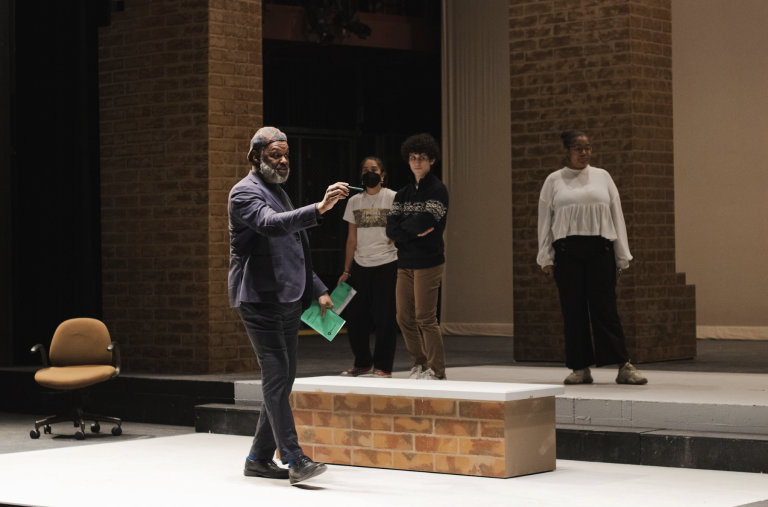TRIP SLAYMAKER ’18
A&E EDITOR
Last Friday, Mar. 17, Trinity alumnus Tucker Carlson ’91 entered the national spotlight, as he does each weeknight at 9pm on Fox News. Carlson drew attention from all corners of the political arena in confluence with the announcement of President Donald Trump’s much debated national budget plan last week. The plan, if set in motion, would slash the budgets of a long list of essential national services and programs, including the Environmental Protection Agency, and the State Department. Trump’s plan would also eliminate the entire National Endowment for the Arts, the Humanities, and the Corporation for Public Broadcasting.
The host of Tucker Carlson Tonight was joined by Robin Bronk, CEO of the Creative Coalition. Her organization has educated leaders in the American arts community on issues of public importance, such as the nature of first amendment rights, arts advocacy and the function of the arts as a public good since its founding in 1989.
Carlson immediately attacked the stance of his guest, first by delegitimizing the importance of the United States’ 50 year history of funding arts programs in every congressional district as a luxury of interest only to the wealthy liberal elites of coastal cities. Over footage of Big Bird, a character from the now-endangered government funded PBS children’s program “Sesame Street,” Carlson derided the notion of any government responsibility to fund the arts as ridiculous, suggesting that all of the hundreds of thousands of government funded arts programs and artists should solicit funding from concurrently liberal sources: billionaires like Mark Zuckerberg and Jeff Bezos. “Why should–in a time of budget deficits, taxpayers be subsidizing entertainment for rich people?”
Bronk responded by reminding Carlson and his viewers of the comparatively minuscule size of the National Endowment for the Arts: its 154 million dollars per year represents less than one thousandth of one percent of the national budget during the Obama administration. Carlson’s assertion that these funds have long been used only to pay already wealthy liberal artists to produce “liberal propaganda” is also patently, singularly false: 40% of NEA-supported activities take place in high-poverty neighborhoods, and 36% of NEA grants go to organizations that reach underserved populations such as people with disabilities, people in institutions, and veterans.
Carlson went on to attempt to point out the uselessness of the NEA by asking “what role did the NEA play in the battle of Fallujah?” One of many absolutely correct responses to this question, posed in an effort to ridicule, might be a simple reference to the NEA Military Healing Arts Partnership, a service that provides veterans access to art workshops as an effective treatment for PTSD.
Carlson’s television argument- as all television arguments must- drew both extreme ire, and admiration. The consummate showman, Carlson likely struck some viewers as a witty pragmatist when he laughed off Robin Bronk’s pleas for a more worldly, historically contextual view of the matter of arts funding, and uttered the phrase “As long as I can put the Arts in a holster, I’m totally for it.”
Tucker Carlson’s views on government arts funding may well prove to be motivated purely by this political moment in time, as his was one of the few conservative programs on Fox News to openly support this particular facet of the Trump budget. His significance here comes not from the point of political argument, but as an alumnus of this college who finds himself so fundamentally against the grain of history.
Government grants dedicated to Arts and Entertainment are not misplaced: they are the seeds of the very culture we move through on a day-to-day basis. Money given to the NEA is used to provide equal access to the arts, supporting performances, exhibitions, healing arts and arts education programs, festivals, and artist residencies. Carlson’s assertion that government sponsored artists are inherently propagandists, akin to “DMV workers with shabbier outfits” is both offensive, and untrue. Of every government funder, the NEA is among those which costs the least and provides the most benefits: these include a wide variety of aid to the underprivileged and provide economic growth.
Though there are more significant deletions in President Trump’s public budget proposal, the elimination of Arts and Humanities funding is, in isolation, totally unjustifiable. As Winston Churchill (not an American, though hopefully a role model) said in 1938, “The arts are essential to any complete national life. The State owes it to itself to sustain and encourage them….Ill fares the race which fails to salute the arts with the reverence and delight which are their due.” It is the responsibility of every nation that has the ability to nourish and support programs that serve such an enormous and immediately palpable effect. In failing to recognize the essential bedrock of cultural support that really and truly makes America great, Carlson does a great disservice to the reputation of Trinity College, a reputation he carries with him wherever he goes.
Tuesday, January 14 2025
The Student Newspaper at Trinity College in Hartford, Connecticut




+ There are no comments
Add yours